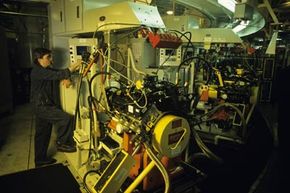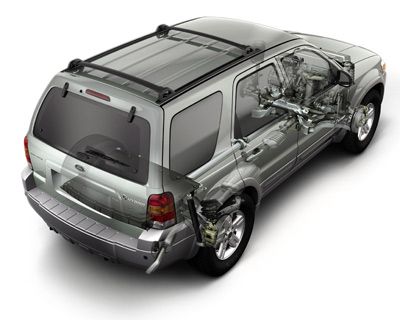Diesel engines have never really caught on in passenger cars. During the late 1970's, diesel engines in passenger cars did see a surge in sales because of the OPEC oil embargo (over half a million were sold in the U.S.), but that is the only significant penetration that diesel engines have made in the marketplace. Even though they are more efficient, there are eight historical problems that have held diesel engines back:
- Diesel engines, because they have much higher compression ratios (20:1 for a typical diesel vs. 8:1 for a typical gasoline engine), tend to be heavier than an equivalent gasoline engine.
- Diesel engines also tend to be more expensive.
- Diesel engines, because of the weight and compression ratio, tend to have lower maximum RPM ranges than gasoline engines (see Question 381 for details). This makes diesel engines high torque rather than high horsepower, and that tends to make diesel cars slow in terms of acceleration.
- Diesel engines must be fuel injected, and in the past fuel injection was expensive and less reliable.
- Diesel engines tend to produce more smoke and "smell funny."
- Diesel engines are harder to start in cold weather, and if they contain glow plugs, diesel engines can require you to wait before starting the engine so the glow plugs can heat up.
- Diesel engines are much noisier and tend to vibrate.
- Diesel fuel is less readily available than gasoline.
One or two of these disadvantages would be OK, but a group of disadvantages this large is a big deterrent for lots of people.
Advertisement
The two things working in favor of diesel engines are better fuel economy and longer engine life. Both of these advantages mean that, over the life of the engine, you will tend to save money with a diesel. However, you also have to take the initial high cost of the engine into account. You have to own and operate a diesel engine for a fairly long time before the fuel economy overcomes the increased purchase price of the engine. The equation works great in a big diesel tractor-trailer rig that is running 400 miles every day, but it is not nearly so beneficial in a passenger car.
As mentioned, the list above contains historical disadvantages for diesel engines. Many of the new diesel engine designs using advanced computer control are eliminating many of these disadvantages -- smoke, noise, vibration and cost are all declining. In the future, we are likely to see many more diesel engines on the road.
Advertisement


